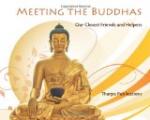CUNNING BEE.
Said a little wandering maiden
To a bee with honey laden,
“Bee, at all the flowers you work,
Yet in some does poison lurk.”
“That I know, my little maiden,”
Said the bee with honey laden;
“But the poison I forsake,
And the honey only take.”
“Cunning bee with honey laden,
That is right,” replied the maiden;
“So will I, from all I meet,
Only draw the good and sweet.”
Anon.
GRASSHOPPER AND CRICKET.
The poetry of earth is never dead!
When all the birds are faint with the hot sun,
And hide in cooling trees, a voice will run
From hedge to hedge about the new-mown mead;
That is the grasshopper’s, he takes the lead
In summer luxury; he has never done
With his delights, for when tired out with fun
He rests at ease beneath some pleasant weed.
The poetry of earth is ceasing never:
On a lone winter evening, when the frost
Has wrought a silence, from the stove there shrills
The cricket’s song, in warmth increasing ever;
And seems to one in drowsiness half lost
The grasshopper’s among some grassy hills
John Keats
PATIENT WEAVERS.
Is a spider an insect? If you have thought so, you have been mistaken. Insects are made up of three distinct parts; they always have six legs, and they breathe through air-tubes along the sides of their bodies.
Spiders breathe through lungs as we do. Their bodies are in two sections, and instead of six legs they have eight. They have six or eight eyes on the top of the head. The spider spins from her body a silk so fine that we can scarcely see it, of which she makes a web as carefully measured as if she had a foot rule. In fact, she has a useful pair of compasses in the shape of claws at the ends of her fore legs.
The spider is one of the most industrious, cleanly, and patient workers in the world. More than six hundred separate strands go to make one slender thread of her web. She can choose, moreover, whether she will spin a fine or coarse, a dry or spangled thread for the particular work she has in hand.
In an hour a spider will make a web more than half a yard across, and of a strength wonderful in proportion to its size. Steel wire of the same thickness as a spider’s thread would be less than two-thirds as strong.
The spider is a devoted mother, and will die with her little ones rather than leave them. Some kinds of spiders carry their babies about with them, while others fasten their cradles to a crevice in the wall. Spiders are very useful to us in destroying the flies and troublesome insects that annoy us. Though spiders are often called cruel, they never torture their victims, but kill them at once by means of a poisonous fluid which is said to deaden pain.




